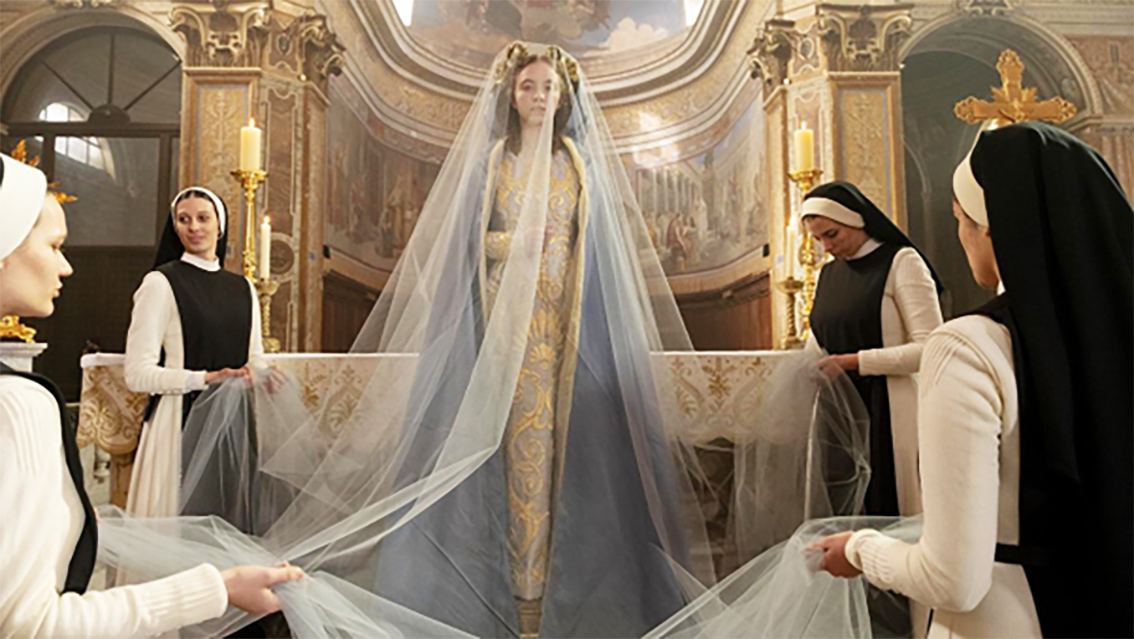In “Immaculate”, Sister Cecilia (played by rising-star Sydney Sweeney) is a young nun whose new role at a remote Italian convent begins to threaten the limits of her faith, and then her life. It’s an intriguing set-up on paper.
Religion and horror have been a complementary duo in art, even predating film. So, then, why do the two things feel like such an incongruous union for much of the 90-minutes of director Michael Mohan’s newest film?
It’s a matter of faith. “Immaculate” does not quite know what to do with it, or how to filter the endless possibilities that might come from its premise.
A young and naïve immigrant nun realising that the convent she has travelled to, where most people speak a language she does not understand, offers a wealth of options for tracing the breakdown of her faith as we experience the depraved possibilities of psychological horror.
We might even have endless possibilities from a naïve woman who takes the veil not because of her own devoutness but as a means of escape.
“Immaculate” can be neither of these films because it offers no point-of-view on Cecilia’s relationship with her faith.
This ambivalence is instructive in revealing a dichotomy at the centre of “Immaculate”. It finds itself uncertain whether it wants to derive its horror instincts from a gory entry in nunsploitation cinema, or if it wants to offer a vituperative critique of the commodification of women’s bodies.
The first film depends on a more gleeful engagement with the perverse than “Immaculate” can sustain, and the latter depends on a film that would need to go much harder with its themes to offer something beyond the generic.
But this film cannot give us a wild romp of gory things happening to nuns, nor can it offer us a psychologically unnerving interplay with the Roman Catholic faith. Instead, “Immaculate” spends most of its time asking Sweeney to shoulder most of its running-time which is not a wholly fruitless choice. But it has its limits.
Sweeney’s history with “Immaculate” is a decade old, when she auditioned for the role in a different version of the screenplay.
As her star has risen from “White Lotus” to “Euphoria” and most recently to “Anyone But You” she’s insisted on stretching her acting abilities by moving in varying genres.
It’s an impressive sign of a young performer who is committed to diversifying her résumé and charting her own course. She’s also a producer on the film which sees her digging into her potential as a scream queen.
When Cecilia, a virgin, finds herself pregnant weeks into her time at the convent she begins to realise that the ailing women, and the seemingly charming Father Sal Tedeschi (Álvaro Morte), are signs of something much wilder than she might imagine. Things escalate when a nun commits suicide, and another is assaulted. Before long, the thing growing inside of Cecelia threatens to be a symbol of the worst of the world.
Much of what works about “Immaculate” does so because of Sweeney’s gumption. She tries. She really does; even as you almost see the beads of sweat forming on her head as she tries to spin gold from the straw. In an early scene, a friendly nun Gwen (Benedetta Porcaroli) confesses to Cecelia that she joined the convent to escape an abusive relationship. Sweeney’s earnest query as to whether her colleague even believes in God offers more in the way of thematic resonance than the film itself, which feels unable to turn that question on its main character. And alas, the film does not realise Gwen might be its most interesting character. Elisha Christian’s cinematography is working to add a level of depth to the images, but the screenplay’s shallowness seems to resist her at every turn.
Establishing a firmer idea of who Cecelia is, and what her journey to God is beyond a childhood story of almost drowning in ice, would give the mounting terror that the final act requires much more of an effective foundation. One might be forgiven for imagining that the film was reverse engineered from that final sequence. That final scene is more articulate in metaphor, image, and symbolism than the film that comes before. It also uses its too-many close-ups in interesting ways. Comparatively, the final sequence is a boon to “Immaculate”. It allows it a chance of ending with one of its better moments and almost tricking us into considering the film that became before as more engaging than it was. Unfortunately, it also reveals a limit in Sweeney’s relationship with the role that kept lingering with me.
“Immaculate” knows we’re waiting to hear Sweeney scream. By failing to make Cecelia especially rigid in her devotion, we find her unsettled from her first few minutes at the convent. So, we are waiting from the onset for her wincing and suspicions to give way to full-throated screams. And we get them soon enough. That final scene emphasises the screams. And I realised something in that final sequence that feels endemic to “Immaculate”. Sweeney has an excellent pair of lungs on her, but they’re not put to good use here. She commits with gusto but each scream after scream in “Immaculate” sounds like it’s coming from her throat rather than her diaphragm. And you just can’t get good depth of sound if it’s not coming from your diaphragm. If it’s not digging deep. Otherwise, the sound feels tinny and hollow, flat and even shallow. Kind of like “Immaculate”.
“Immaculate” is playing in cinemas






